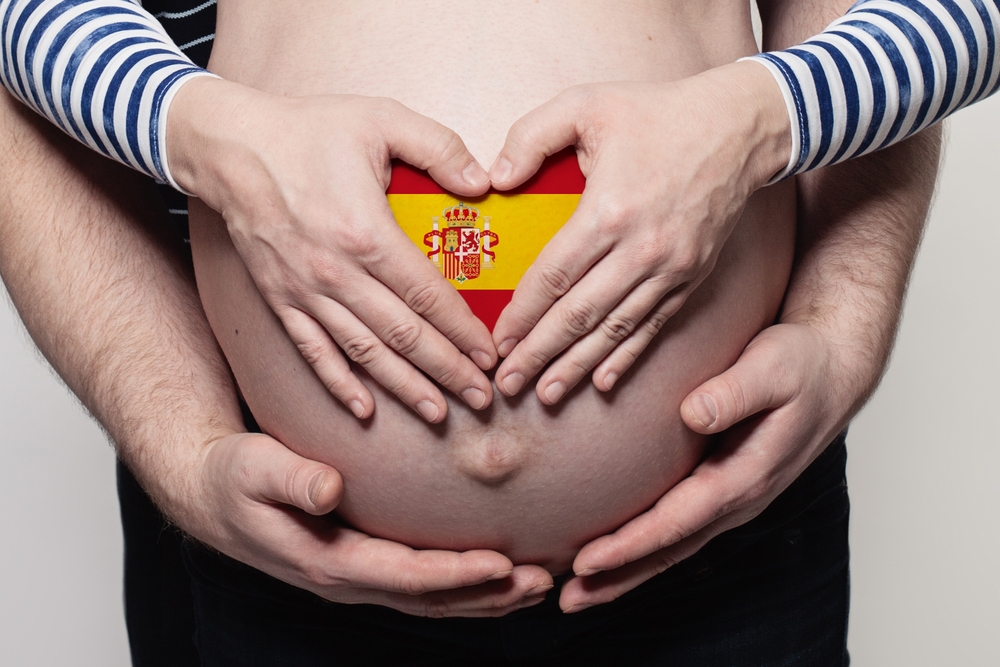Bowing to pressure from the radical Left, the Sánchez government, and the mainstream media, Spain’s center-right won’t support pro-natalist measures and better information for women who consider aborting their children.
After a “health protocol” proposed by Castilla y León’s vice-president from Vox was defeated by Alberto Núñez Feijóo’s People Party (PP), which is the senior coalition partner in the regional government, tensions are running high between the two parties that make up the Spanish right.
The PP’s attitude has led some 500 doctors to sign a manifesto penned by the +Vida Foundation to protest the current situation whereby, in Spain, “there is an attempt to hide” the heartbeat of the embryo-fetus from pregnant women who decide to have an abortion.
Vox’s Juan García-Gallardo, the vice-president of the Castile y León region in Spain, announced the proposed measures to promote natality and enhance support for pregnant women on Jan. 12, during a press conference which he held together with Economy and Finance councilor Carlos Fernández Carriedo from the PP, who is also the regional government’s spokesperson. In Spain’s regions – or autonomous communities – a councilor is the equivalent of a minister at the national level.
The planned measures were supposed to make it compulsory for health professionals to give pregnant women three possibilities, in particular when they consider an abortion: to get free psychological and social care, to be able to listen to the embryo’s or fetus’ heartbeat, and to get a 4D ultrasound of the baby in the womb. While the new “health protocol” was to be binding for health professionals, pregnant women would have been left with the choice of taking advantage of the offer or not.
The idea was to allow parents considering an abortion to make an informed choice and provide them with the necessary support if they chose to carry the baby. “She is not going to be forced to listen to her baby’s heartbeat if she doesn’t want to,” García-Gallardo stressed on Jan. 12, adding that even if the new measures were to save only one child’s life, that would make it worth having entered a government coalition with the PP a year ago.
The Vox politician also insisted the measures he was announcing had been discussed and agreed upon with the councilor responsible for health issues, and that they were part of the coalition agreement signed last year with the PP, which provided for policies to boost natality and support families.
Specifically, psycho-social care was to be guaranteed to all mothers “who ask for it” and health professionals would have had to inform each pregnant woman of this possibility, so “they have all the support to face the pregnancy in the best circumstances and feel accompanied,” and are thus truly able to choose between the “natural and proper” decision to continue with the pregnancy or the “social tragedy” of abortion, which leaves “a mark on women” and implies “a drama”, the Vox politician explained, with his PP colleague assenting next to him.
The latter furthermore clarified that the use of budget money to implement this service would depend “largely” on its use, so it is “difficult to quantify” beforehand, but, he said, “it is important to provide an adequate service whatever its cost.”
On Jan. 12, the regional government’s PP spokesman was actually the first to speak, introducing as follows the topic that was going to be addressed during his joint press conference with his colleague from Vox:
“The Vice-president of the Junta de Castilla y León [Juan García-Gallardo] is with us at this press conference in relation to the implementation of (…) actions in favor of the natality and the family, measures that come to comply with the Government Pact that we signed during this legislature and which among its main objectives included the promotion of natality and the fight against depopulation. These measures have been brought to the attention of the Governing Council by both the Vice President of the Junta de Castilla y León and the Regional Ministry of Health, who have been working together in this area, and they will be implemented in the health sector by the Regional Ministry of Health.”
However, a few days of sustained attacks from the pro-abortion Left were enough to make the “center-right” PP renege on its commitments and forget that it used to be, just a decade ago, a party that was – officially at least – even against abortion on demand.
The national government, led by socialist Prime Minister Pedro Sánchez, threatened to take the planned measures to the courts, arguing that they were putting pressure on women not to abort, and insisting the regulation of abortion is not a competence of the autonomous communities.
As the mainly pro-abortion mainstream media were railing at this “radical” anti-abortion policy and demanding the PP put an end to its regional cooperation with the “far right”, Castile y León’s PP President Alfonso Fernández Mañueco and PP leader Alberto Núñez Feijóo both pretended the measures announced by Juan García-Gallardo were its own personal initiative, that no document existed on that matter, and that what was announced at the Jan. 12 press conference had not been agreed with the rest of the regional government.
Feijóo sent the spokesman of the PP campaign committee, Borja Sémper, to say in a press appearance that his party “is not going to swallow everything” and will express its rejection of the measures with which it does not agree and Vox “wants to impose.”
Only the PP president of the Madrid region, Isabel Díaz Ayuso, when asked about Spain’s liberal abortion law by Spanish television Antena 3, noted:
“We always act with much indifference, without taking into account that in our country there are already more than 100,000 abortions a year. So I don’t know where the progress is here. There is the freedom to do it, but we do not put ourselves in the shoes of people who do not get to be born, who are, well, directly aborted. We do not put ourselves in the shoes of women who have no resources, of people who are forced to abort. We do not put ourselves in the shoes of doctors against whom they now want to make black lists to force them to do abortions.”
In Castile y León, tension runs high between the two coalition partners as Juan García-Gallardó has reportedly called the PP regional president a “coward” and reproached him for backing out of measures that had been agreed upon and reviewed by the two wings of the government before presenting them to the media on Jan. 12.
In Madrid, Vox leader Santiago Abascal turned to Alberto Núñez Feijóo on Tuesday, Jan. 24, when answering the Prime Minister Sánchez’s intervention in parliament, reproaching the PP’s leader for disavowing the PP-Vox coalition in Castile y León and asking: “Did you need the PSOE’s permission?” “When we negotiate something with you are we going to have to go and ask permission from these gentlemen?”
Abascal insisted the only aim of the measure announced on Jan. 12 in Castile y León was to provide women with more information during their pregnancy. “Who is against this? What are they afraid of? What do they want to hide?” he asked, warning that in Vox they had taken note of what had happened for future electoral pacts.





